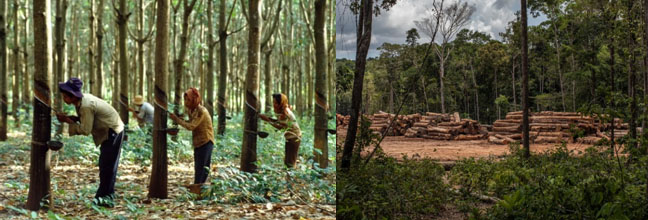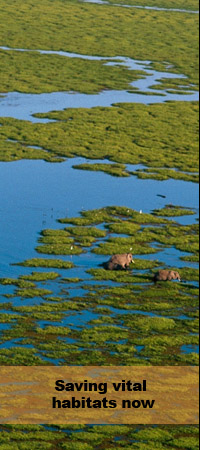|
Avocado plantations
The United States imports 87 percent of its avocados from a single Mexican region, Michoacán. Although environmental and social costs associated with avocado production are huge, consumers and retailers in the U.S. cannot clearly discern them in part due to complex, opaque supply chains. During the last two decades, the consumption of avocados (Persea americana) has increased worldwide due to its known nutritional properties, as well as its potential medicinal and industrial applications. Mexico is the major avocado producer in the world and supplies 66% of the global demand. The state of Michoacán, located in central Mexico, provides 80% of the national production on a surface of approximately 170,000 hectares. Massive avocado plantations have been established in western and central Michoacán in a region known for its volcanic soils rich in organic matter and covered mainly by pine-oak forests.
The conversion from natural forest and small traditional agricultural lands has been the main mechanism for the establishment of avocado orchards. In recent years, illegal avocado plantations within natural protected areas have increased worldwide including in Mexico, Indonesia and the Philippines. For example, in Mexico, avocado orchard expansion has reached the region near the Monarch Butterfly Biosphere Reserve during the last 25 years. This natural protected area is located in the Mexican States of Michoacán and Mexico, where the endangered monarch butterflies overwinter each year in montane conifer forests. In the Philippines, illegal plantations of avocado for exportation have been planted within the Mt. Matutum Protected Landscape in southern Mindanao where rich volcanic soil is found.

Photos. Rainforest destruction due to mass scale rubber and avocado plantations
Rubber plantations
The rubber tree was “discovered” by Europeans in the Americas but was already used by the natives on the Caribbean islands. Rubber plantations are mostly operated by smallholder farmers (approx. 85%). In order to get the latex, the workers carve cuts into the rind so that the juice can come out. Worldwide plantation of rubber trees comes from a complicated network of middlemen and processors to supply a handful of major tire manufacturers including Bridgestone, Continental, Michelin, Goodyear, and Pirelli.
One of the least revealed causes of tropical deforestation is the spread of rubber plantations driven mostly by the demand for more than 2 billion new tires each year. Further, the transition to electric vehicles and the demand for more individual cars will accelerate rubber use. Therefore, it is not good news for rainforest. Many regions of the world are currently losing their rainforest for rubber trees like Cambodia and Brazil. Rubber plantations now occupy at least 35 million acres of Southeast Asia, where Thailand, Indonesia, and Vietnam are the world’s top three natural rubber producers.
Plantation expansion is driven mainly by the tire industry, which accounts for most natural rubber consumption. However, the material’s versatility makes its application ubiquitous; apparel, condoms, personal protective equipment, medical equipment and flooring can all contain natural. And as we make more cars, trucks and planes, we need ever more rubber to clothe their wheels.
Time for actions, time to stop additional deforestation and really think about our lifestyle.
What can you do?
Join ESI to protect and restore rainforest. ESI is one of the leading and most effective rainforest conservation organizations. We aim along with other organizations and governments to protect at least 50 percent of rainforest around the world by 2030. Tell U.S. grocery stores to adopt avocado-sourcing policies that protect human rights and monarch habitat. Reduce your reliance on the car through the use of public transport. Cars use much more rubber per-person-kilometer than buses, trains, or bicycles. Support government regulations to stop importing rubber grown on illegally deforested land. Leading the way is the European Union, whose 27 members use about a tenth of the world’s rubber. Consume less, we are overproducing and overconsuming.
Materials on this website are Copyright by Endangered Species International, Inc. all rights reserved.
Donate! |
Site and Image use! |
Photo Credits! |
Contact Us! |
Home!
|











